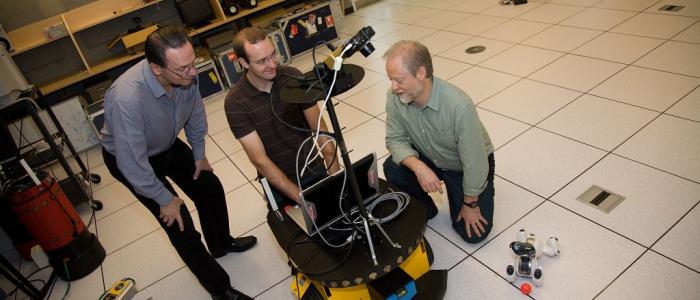
Research Award Opportunities
One of the most valuable research experiences for an undergraduate student is to be a research assistant. Each year, the department receives a number of research awards that help provide funding for an undergrad student to spend 16 weeks over the summer working full time in one of the department’s research labs, often with the opportunity to publish their work (see examples of previous projects.) This kind of research experience is highly sought after by graduate programs.
All applicants must confirm their eligibility to apply and to work. You must have all necessary requirements prepared (ex. Social Insurance Number and permits).
International students must have a valid Social Insurance Number and be eligible to work on campus for the duration of the award (ex. in the summer). you will be required to provide any necessary details and documentation upon accepting the award (SURE or WLIUR). This is necessary for processing and payment. If you are offered an award but do not meet this criteria, you will not be able to accept. For questions about eligibility, please speak with an International Student Advisor.
Award Categories
The positions are available to 2nd, 3rd, and 4th year students with strong academic records. You'll find more information about the awards available, including eligibility requirements below. Watch for in-class and email announcements from the department for details and deadlines.
NSERC USRA
NSERC Undergraduate Student Research Award
SURE
Science Undergraduate Research Experience Award
WL IURA
Work Learn International Undergraduate Research Award
Work Learn International Undergraduate Research Award Science Blog
Additional Resources
Eligible UBC Grant Holders in the Faculty of Science for NSERC USRA 2025 - 2026
How to Apply
Deadline: February 6, 2026 at 4:00 PM
New Application Requirement: all applicants are required to apply with a confirmed supervisor. The list of projects and supervisors will be posted on this page, and you can use this to approach any of the supervisors listed. However, you aren't limited to the projects and supervisors listed below. We encourage you to directly contact professors you would like to work with to find a match. Many professors will be happy to talk to you about the opportunity to hire students at a subsidized wage. You can find our faculty directory here. For some additional tips, please see the UBC Careers page.
Required Steps:
- Read the details above and the information at the links on this page
- Determine which awards you are eligible for
- Contact potential supervisors from the Projects and Supervisors list (see below) or by approaching Computer Science faculty members you would like to work with
- Once you have a confirmed supervisor, submit the online application webform by the stated deadline (the webform will become available before the deadline):
- Before submitting, please ensure that you have read over the online guidelines, eligibility requirements, and webform instructions carefully
- Make sure to read all of the instruction text in the webform, there may be important details noted below each field
- When the department is informed of how many awards are available, a departmental adjudication committee will rank the applications based primarily on the student's academic record. All applicants will then receive a decision. If you are selected for an award, you will then receive an email with instructions to submit a new webform to provide additional information/documentation:
- When you are applying: please read the webform carefully to ensure you are prepared to accept by providing these details
- (Your supervisor will also be contacted for required information)
APPLY HERE - NSERC / SURE / WL IURA Application Webform
IMPORTANT:
- All students should complete the NSERC Form 202 on the NSERC USRA website by clicking "On-line System Login" or, if you are a first-time user, "Register"
- All students should upload a PDF of the completed NSERC Form 202 to the online application webform
- DO NOT submit the application on the NSERC website until you have been accepted for the award and instructed to do so (at the end only students awarded for NSERC USRA will submit the application to NSERC website)
- Instructions on how to complete the forms can be found on the NSERC USRA website
Questions? For further details, please visit the UBC Student Services website or the NSERC USRA website and review the information and links provided, as these will likely give you the answers to your questions. If you would still like additional assistance, please see our Advising Webform instructions to see if you are eligible to submit a webform request.
Projects and Supervisors: Summer 2026
[Project Details to be available roughly in middle of January 2026]